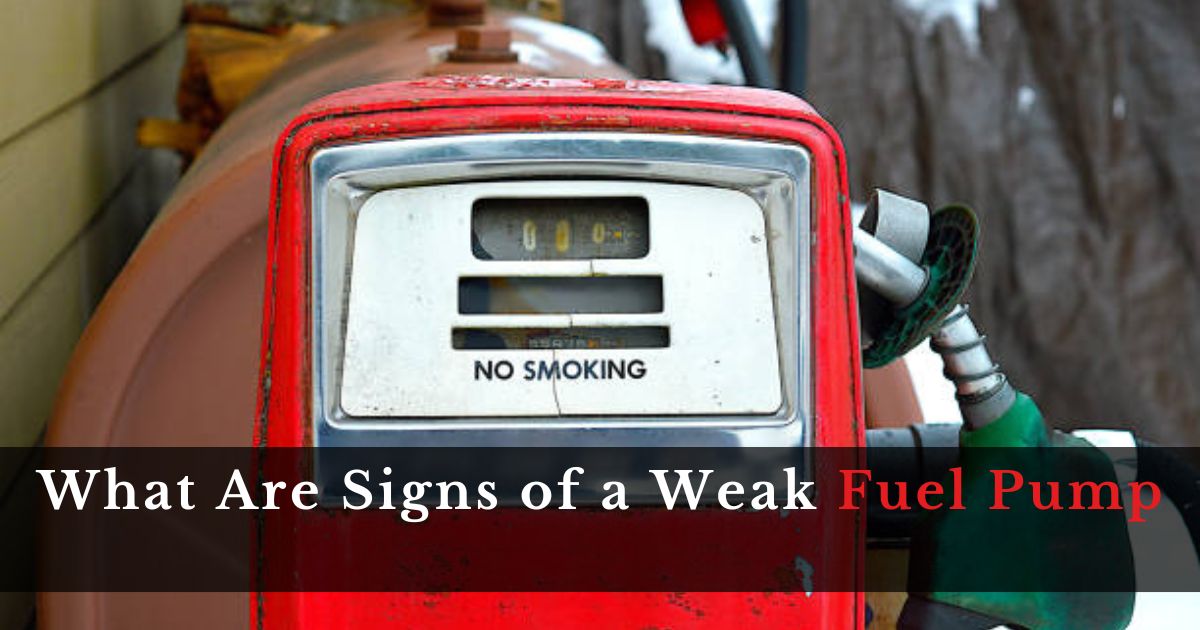What are signs of a weak fuel pump, Think of a car’s fuel pump as its heart. It works by pumping fuel from the gas tank to the engine. However, like any other part of a car, it can get worn out as time goes by. It’s really important to know the signs of a weak fuel pump. This helps keep your car running well and prevents it from breaking down while you’re driving.
What Are Signs of a Weak Fuel Pump?
When your vehicle’s fuel pump starts to weaken, it can lead to various problems that affect your car’s performance. Recognizing these signs early can prevent further damage and ensure your safety on the road. Here are some common indications of a weak fuel pump:
Engine Sputtering
If your engine frequently sputters or hesitates during acceleration, it could be a sign of a weak fuel pump struggling to deliver an adequate fuel supply to the engine.
Loss of Power During Acceleration
When you experience a sudden loss of power or sluggishness when accelerating, it may indicate that your fuel pump is not providing enough fuel to support the engine’s demand. Another red flag to watch out for is a sudden loss of power while driving. If your car feels like it’s sputtering or struggling to accelerate, especially at higher speeds or when going uphill, it could indicate that the fuel pump is failing to maintain consistent fuel pressure. This can result in engine hesitation and a lack of responsiveness when you press down on the gas pedal.
Difficulty Starting the Engine
A weak fuel pump can cause difficulty in starting your vehicle, especially after it has been sitting for a while. You may notice prolonged cranking or multiple attempts before the engine starts.One of the earliest signs of a weak fuel pump is difficulty starting your engine. If you find yourself having to crank the engine multiple times before it starts, or if it takes longer than usual to fire up, it could be a sign that your fuel pump is struggling to deliver an adequate amount of fuel to the engine.
Surging or Fluctuating Engine Speed
Fluctuations in engine speed, also known as surging, can occur when the fuel pump fails to maintain a consistent fuel flow, resulting in irregular engine performance. In addition to stalling, a failing fuel pump can cause your engine to surge or buck while driving. You might notice this as a sudden jerking or lurching motion, especially when accelerating or maintaining a steady speed. This can be dangerous, as it can affect your ability to control the vehicle and increase the risk of accidents.
High-Pitched Whining Noise from the Fuel Tank
A faint, high-pitched whining noise coming from the vicinity of the fuel tank could indicate that the fuel pump is failing and struggling to maintain fuel pressure.
Stalling at High Temperatures
If your vehicle tends to stall or shut off unexpectedly, especially when operating at high temperatures or under heavy load, it could be a sign of fuel pump overheating or failure. A weak fuel pump can also cause your engine to stall unexpectedly, particularly when idling or coming to a stop. If your engine frequently stalls or dies out for no apparent reason, it’s worth considering the possibility that the fuel pump is to blame. This is especially true if the stalling tends to occur when the engine is warm or after extended periods of driving.
Decreased Fuel Efficiency
A weak fuel pump may lead to decreased fuel efficiency, causing your vehicle to consume more fuel than usual for the same distance traveled.
Engine Misfires
Engine misfires, characterized by a jerking or shaking sensation, can occur when the fuel pump fails to deliver a consistent fuel supply to the engine cylinders, resulting in incomplete combustion.
Unusual Noise from the Fuel Tank
Finally, listen for any unusual noises coming from the fuel tank area, particularly a whining or humming sound. While some noise is normal, excessive or unusual sounds could indicate that the fuel pump is straining to deliver fuel properly. This is often most noticeable when the fuel level is low or when the engine is under heavy load.
Your car’s fuel pump plays a crucial role in its overall performance, so it’s essential to recognize the signs of a weak pump before they lead to more significant issues. If you notice any of these symptoms, don’t ignore them—schedule a diagnostic check with a qualified mechanic to pinpoint the problem and avoid getting stranded on the side of the road. Taking proactive steps to address a weak fuel pump can save you time, money, and hassle in the long run, ensuring that your car stays running smoothly for miles to come.
FAQs:
How long does a fuel pump usually last?
Fuel pump lifespan can vary depending on factors such as driving habits and fuel quality, but on average, they can last between 100,000 to 200,000 miles.
Can a weak fuel pump cause engine damage?
Yes, a weak fuel pump can lead to engine damage if not addressed promptly. Insufficient fuel supply can result in lean fuel-air mixtures, leading to overheating and other issues.
Is it safe to drive with a weak fuel pump?
Driving with a weak fuel pump is not recommended as it can result in engine stalling, loss of power, and other safety hazards.
How much does it cost to replace a fuel pump?
The cost of replacing a fuel pump can vary depending on the make and model of your vehicle and labor costs. On average, it can range from $300 to $1000.
Can I replace a fuel pump myself?
While some experienced DIYers may attempt to replace a fuel pump themselves, it’s generally recommended to have it done by a professional mechanic to ensure proper installation and avoid potential safety risks.



